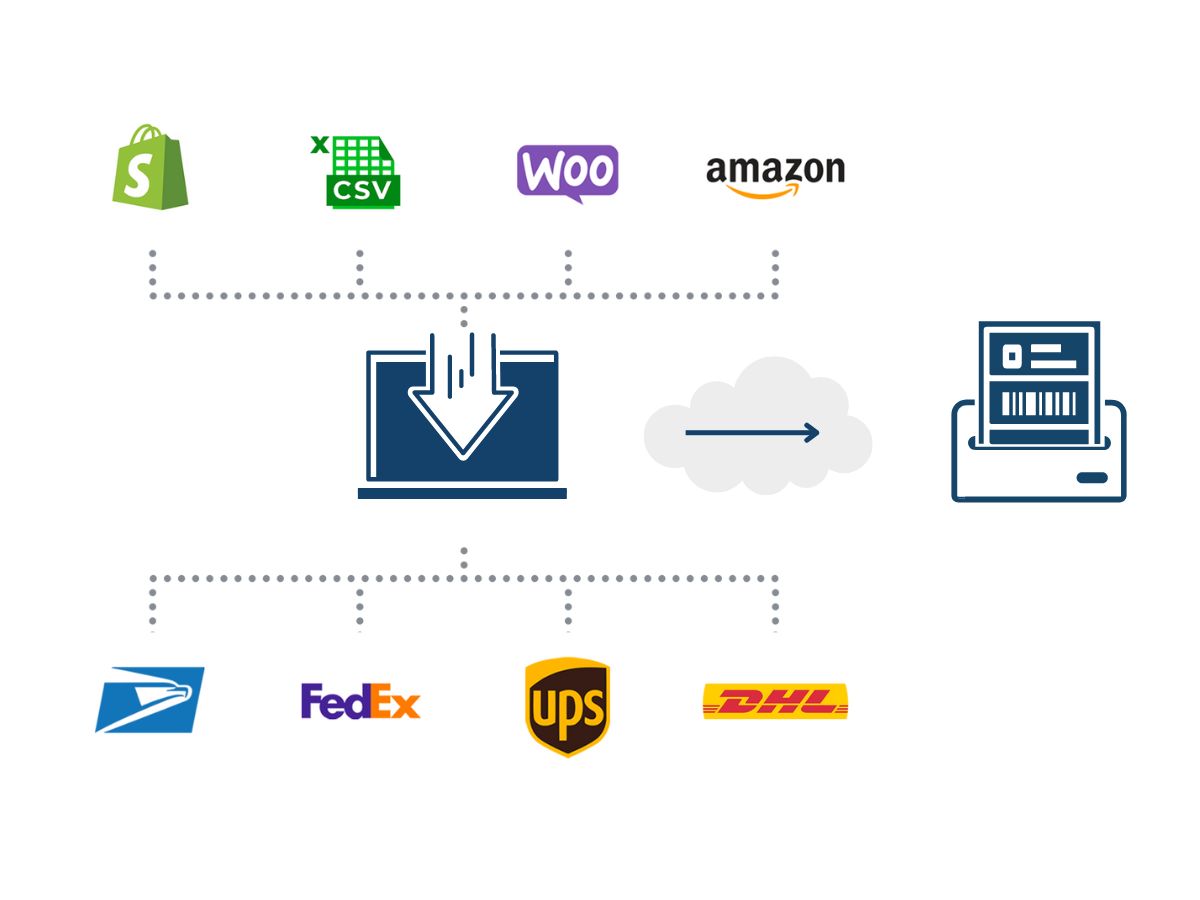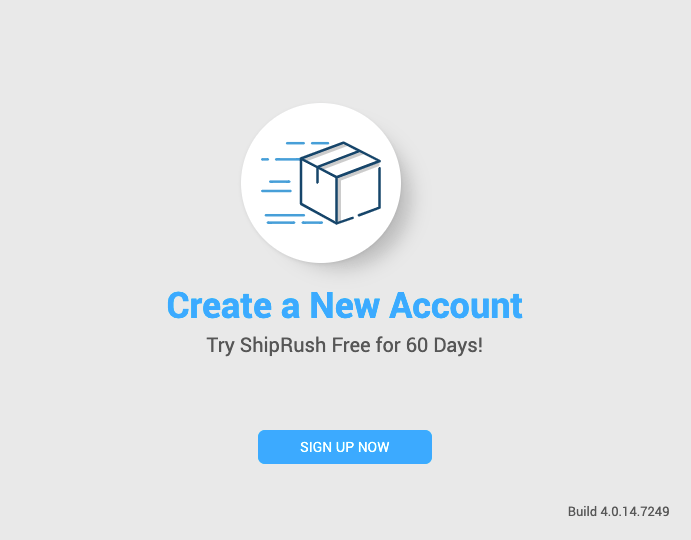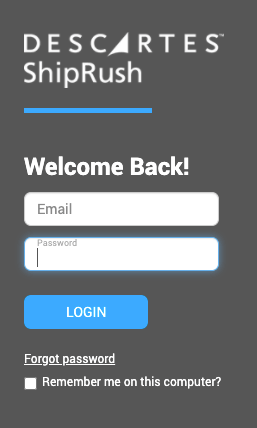
Table of Contents
- What is shipping management software?
- How does shipping management software work?
- What are the best shipping management software brands?
- How is it different from a warehouse management system (WMS)?
- Why use software for ecommerce shipping?
- Is shipping management software right for my business?
- How can I integrate shipping software with my other systems?
- Is Descartes ShipRush the best option for my business?
- Key Takeaways
How you decide to manage your shipping operations can be vital to your ecommerce business’ success. From ecommerce giants to single-marketplace sellers, many savvy brands use shipping management software to boost customer satisfaction, reduce operational costs, and supercharge overall business performance.
Let’s examine how shipping management software works, its benefits, and when it’s the right option for your business.
What is shipping management software?
Shipping management software streamlines and optimizes the shipping process. By integrating with your existing ecommerce sales channels, it automates shipping-related tasks, provides real-time tracking, and facilitates better carrier selection. Incorporating shipping software into your ecommerce operations is the best way to ensure on-time delivery while controlling costs and providing an excellent customer experience.
How does shipping management software work?

Connects all sales channels and carrier accounts
Shipping management software connects all your sales channels (like Shopify and Amazon), ERPs such as Oracle Netsuite, and warehouse management systems (like Descartes Peoplevox) with carrier accounts such as USPS, FedEx, UPS, and DHL. Instead of logging into multiple programs to update order status and tracking, you can view and ship all orders from one screen. This ensures a seamless and error-free shipping experience.
Finds the best rates and shipping services
Shipping management software can offer discounted shipping rates from carriers and allows you to compare shipping rates and services from multiple carriers, displaying options side-by-side. It then recommends the best service for each order based on cost and delivery speed. You can also set up business rules to automatically select the right service based on different parameters, such as “cheapest,” “fastest,” or “eco-friendly.”
Manages shipment tracking and returns
Once a shipping method is picked, the software will generate compliant shipping labels, including tracking numbers. Some shipping management software has real-time branded tracking capabilities and built-in automated notifications to inform customers about their order status, improving reliability and transparency. Additionally, the software can simplify returns by automating the generation of return labels and processing of returns.
What are the best shipping management software brands?
Five popular software brands to manage shipping operations for a mid-sized business include:
How is it different from a warehouse management system (WMS)?

In short, shipping management software handles shipment information and printing labels, while warehouse management system (WMS) software streamlines order fulfilment by keeping track of each item’s location in the warehouse. It handles inventory receiving and put away, multi-order picking, and other warehouse workflows. Sometimes shipping software and WMS software are already integrated to facilitate easy pick-pack-ship workflows.
While you can purchase standalone shipping software, you must make sure it works seamlessly with your WMS and other systems. Warehouse shipping software integrates to minimize errors, reduce manual labor, eliminate double data entry, and enhance customer satisfaction by ensuring faster order fulfilment.
Why use software for ecommerce shipping?
Now that we understand how the software works, here are some major benefits of incorporating it into your ecommerce shipping operations.
1. Cost efficiency
Shipping software enables businesses to compare shipping rates across various carriers, so you can select the most cost-effective option for each shipment. This capability is especially beneficial for companies that ship large volumes of goods, as a small saving on each shipment can accumulate substantial cost savings over time. Additionally, shipping software companies often have relationships with carriers to offer deeply discounted rates for even lower shipping costs.
2. Timesaving
Shipping manually is often time-consuming and prone to errors. Shipping software automates many of these tasks, such as selecting the right service, generating shipping labels, and tracking shipments. Automation frees up valuable time for your employees, allowing them to focus on more strategic business tasks. Additionally, you can automatically update other business systems such as your ERP, WMS, and sales channels, by using integrations. A Netsuite shipping software integration is a great example of this.
3. Enhanced tracking capabilities
Shipping software can allow you to see the real-time status of every delivery wherever it is in the shipping process, so you can quickly address any issues that arise. Enhanced tracking capabilities improve operational efficiency and customer satisfaction. Customers appreciate being informed about the status of their orders, and real-time tracking offers a level of transparency that will build brand trust and loyalty.
4. Better customer experience
Increased efficiency from shipping software helps you keep the delivery promise given to customers at checkout. Accurate and timely shipping status updates reduce anxiety and increase satisfaction. The ability to offer multiple shipping options, such as express or same-day delivery, caters to varying customer needs and preferences. This flexibility can be a stand-out in today’s competitive market, helping businesses to attract and retain new customers.
Is shipping management software right for my business?
Do you struggle with shipping orders on time, controlling shipping costs, and keeping orders and tracking information organized? If so, then it may be time to start using software. Implementing shipping software can revolutionize the way you manage logistics, saving you time, money, and resources.
Need to save time
If saving time is a high priority, shipping software offers automation capabilities that will significantly reduce the manual workload involved in managing shipments. Tasks such as generating labels, calculating shipping rates, and tracking packages can be seamlessly automated, giving your team more time to focus on other business activities.
Need to save money
If shipping costs are eating into your profit margin and you need a better way to save money on shipping, technology can help. Shipping software comes with deeply discounted carrier rates and rate shopping to ensure that you get the best deal on every shipment. Plus, you will reduce labor costs by leveraging technology to complete tedious, repetitive tasks.
Need better organization
Shipping software unites other business systems like ecommerce platforms, ERPs, warehouse management systems, etc. These integrations streamline data exchange between different parts of your business, eliminating the need for manual data entry and reducing errors. As a result, you can view, manage, and track all orders and shipments in one place. Shipping software also updates the other programs.
How can I integrate shipping software with my other systems?

It may seem like integrating shipping software into your systems would be difficult, expensive, and time-consuming. However, most software brands offer pre-built integrations for numerous other programs. After signing up for the shipping software, you use a setup wizard and simply follow the directions to connect your other programs for free.
If you use programs not listed with the other pre-built integrations, many software companies offer custom integrations or API connectivity. These options may be worth considering if the shipping software has all the capabilities you need.
Is Descartes ShipRush the best option for my business?
Descartes ShipRush is a robust shipping management solution intended for mid-sized ecommerce businesses. While small businesses also benefit from our powerful software, we really shine in a fast-paced warehouse environment due to our automation rules, scalability, and pre-built integrations to Descartes Peoplevox WMS and Descartes Mobile Warehouse for NetSuite.
If you need to expertly handle seasonal peaks, sudden spikes in order volume, shipping from multiple warehouses, or a rapidly growing business, Descartes ShipRush may be the shipping software for you. For small businesses and low-volume or occasional shippers, we recommend our user-friendly free shipping software Descartes XPS.
Key Takeaways
- Shipping management software expertly connects sales channels, carrier accounts, and other business systems to enable faster, more cost-effective shipping.
- A warehouse management system (WMS) is not the same thing as shipping management software, and both programs should work together to scale operations.
- This type of software reduces manual labor and saves money by automating shipping workflows and finding the best carrier rates.
- When you consistently struggle with shipping orders on time, controlling costs, and keeping track of information, consider using shipping software.

About the Author
Johannes Panzer is the Head of Industry Solutions for Ecommerce at Descartes. With over 17 years in ecommerce fulfillment and shipping SaaS, Johannes brings a wealth of experience in uniting ecommerce business leaders with the right tools and techniques to overcome logistics challenges and drive profitable growth.









